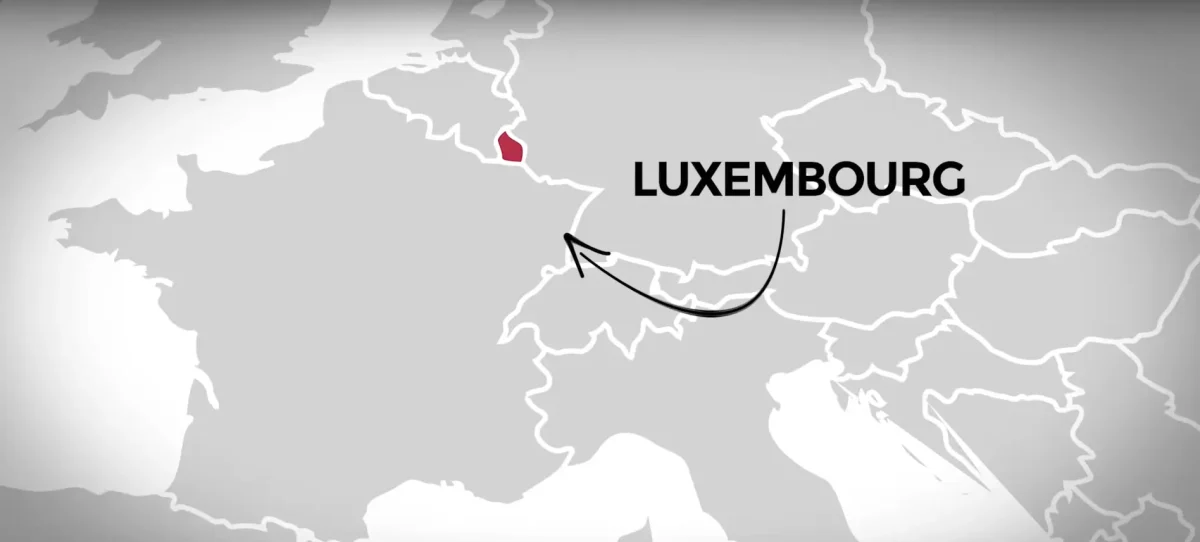About the rich country of Luxembourg – the richest in the world?
The ‘Grand Duchy’ of Luxembourg is 2nd smallest country in the European Union after Malta, with a population of around 650,000.

However, it has the biggest share of immigrants with more than 50% of its residents being foreign-born.
Perhaps the reason it attracts so many immigrants is because it is by some measures the wealthiest country on earth with a GDP per capita of $135,700.
That’s nearly twice as much as the United States of America or Denmark.
Why is Luxembourg’s GDP per capita so high?
The figure of $135,000 is a little misleading in some respects. That’s because around 40-50% of the workers in the country live outside of Luxembourg (Luxembourg.lu, 2023).
So, while they work in Luxembourg, every day after work they cross the border back to their homes, likely in Germany, Belgium or France.
They create wealth in the country, but they do not live there.
As a result, when you divide Luxembourg’s GDP by their population you get such a large number.
Why is Luxembourg so Rich? Steel & Taxes.
18th Century Luxembourg
Historically, Luxembourg was a poor county, with its existence based on two industries: agriculture and iron. In the 18th century, iron was not a particularly revenue-generating commodity.
That all changed with the industrial revolution.
The revolution needed lots and lots of Steel to support it, and Luxembourg had the means to supply it.
In 1842 that Luxembourg became a member of the Zollverein, a free trade zone.
It just so happened that Luxembourg was perfectly situation between Germany, France and Belgium to deliver iron to all three countries via the railroad.
It became a hub for all the trade routes between these major countries.
Incidentally, today, the many of the biggest steel companies are Luxembourgish, including the biggest of them all, Arcelor Mittal. Many New York skyscrapers are built with steel beams made in Luxembourg.
Within a few decades, Luxembourg caught up to the wealth of its neighboring countries through steel production.
1930’s Luxembourg
But Luxembourg did not become the mega-rich nation it is today until it passed the Holding Law in 1929. That is, the creation of corporate holding companies.
The job of corporate holding companies is to mainly manage the property of the subsidiary companies within it.
The Holding law offered ultra-low tax conditions to these holding companies – paying as little as 1% tax.
There were not so many holding companies in the 1930’s, and it was a time of massive expansion for the ones that did exist. So, these few companies did very well.
The seed of a prosperous nation was planted.
1970’s Luxembourg
It wasn’t until the 1970’s that Luxembourg truly took off in terms of its country’s wealth. This is when America began to conquer the world and many new holding companies, that we know very well today, came into existence.
As these companies expanded around the world, they needed to choose a place in Europe to set up their headquarters. Naturally, they wanted to choose a place with the best fiscal conditions.
Enter Luxembourg.
By this time, it had a huge banking industry and talented personnel across a variety of related industries. The best lawyers, accountants and economists were all living there.
They needed to live there to support all the companies taking advantage of Luxembourg’s business-friendly laws.
1980’s Luxembourg
In the 1980s’ Luxembourg’s economy doubled in size within the space of six years, fueled by the aforementioned desire for companies to set up shop there.
2000’s Luxembourg
The online business boom meant that a plethora of new, innovative companies that operated all over the world with dozens of subsidiaries in every country came into existence.
These companies were not based in any specific territory because they sold everywhere. Tech companies were made to love Luxembourg.
In just 5 years, the GDP per capita grew from $50,000 to $100,000.
This is an extraordinary amount of money, and Luxembourg & its residents became very rich indeed.
Today, Luxembourg’s economy is still largely dependent on the steel & banking sectors.
Is Luxembourg a tax haven?
Luxembourg is indeed a corporate tax haven.
A holding company based in Luxembourg does not pay its fair share of taxes.
Its subsidiaries, however, should.
If your company’s subsidiary based in the UK sells in the UK, you still need to pay UK taxes on its profits.
The way that companies get around this is by having no profits in said countries with their subsidiaries.
But how do they do that?
If the holding company gives a loan with a really high interest rate to its subsidiary in the UK, that subsidiary company can record a loss. The holding company on the other hand, records huge profits and pays little tax on it.
The US only began to crack down on these overseas tax loopholes in 2009 after the financial crisis.
In 2014, a leak of financial accounts made these tax evasion strategies clear to everyone; known as ‘Lux Leaks’.
Since then, in 2017, Luxembourg has passed new fiscal reform bills to crack down on these strategies.
How many millionaires are in Luxembourg?
Around 1 in 15 people in Luxembourg are millionaires (Delano, 2023).
That means around 45,000 millionaires reside there – and that’s excluding the people who simply work there, and commute back to their own country.
This has developed its reputation as a country for millionaires, particularly Luxembourg City (the capital).
This could be why Luxembourg residents are the sixth happiest in the world according to the world happiness report, 2022.
See More >> Best Political Systems In The World
What is the minimum wage in Luxembourg?
The minimum wage is about €2,508 a month, or about $2,724 as of 2023 (Take Profit, 2023).
What is the average wage in Luxembourg?
The average wage is about €6,308 a month, or about $6,853 as of 2023 (Take Profit, 2023).
How much is the average house in Luxembourg?
The average advertised house in 2022 was €1,388,411 or just over $1.5m (Just arrived, 2023).
What is the highest paying job in Luxembourg?
Employees in the financial services and insurance sectors earn the highest salaries.
Electricity production workers, science and technical professionals, IT workers, and teachers follow.
High school teacher salaries start at an impressive €73,700 or $80,000 a year.






